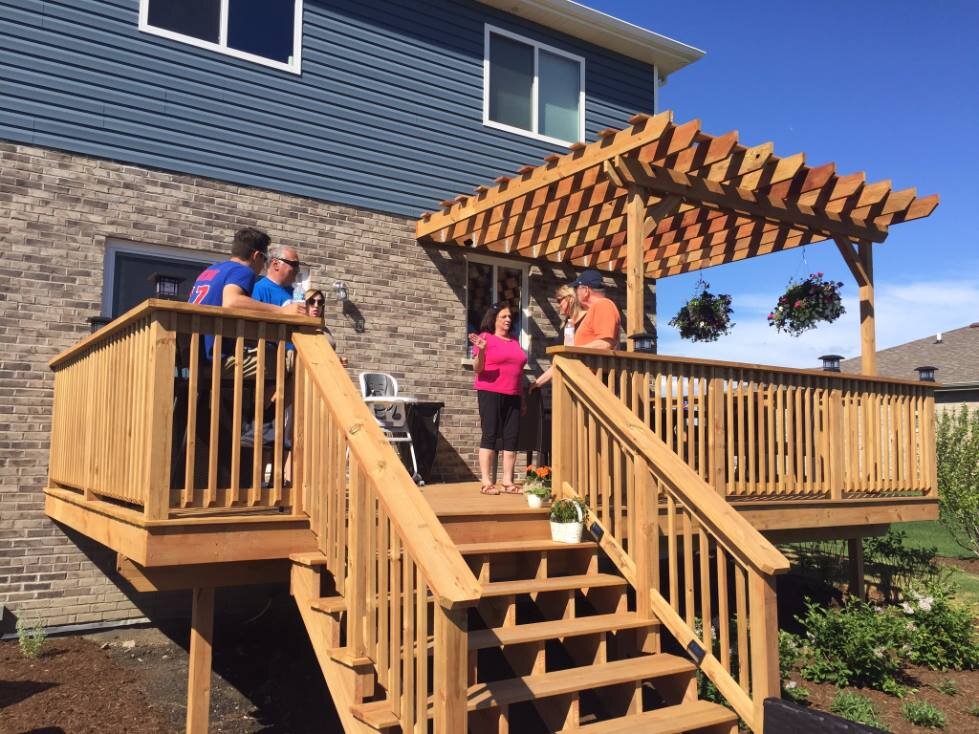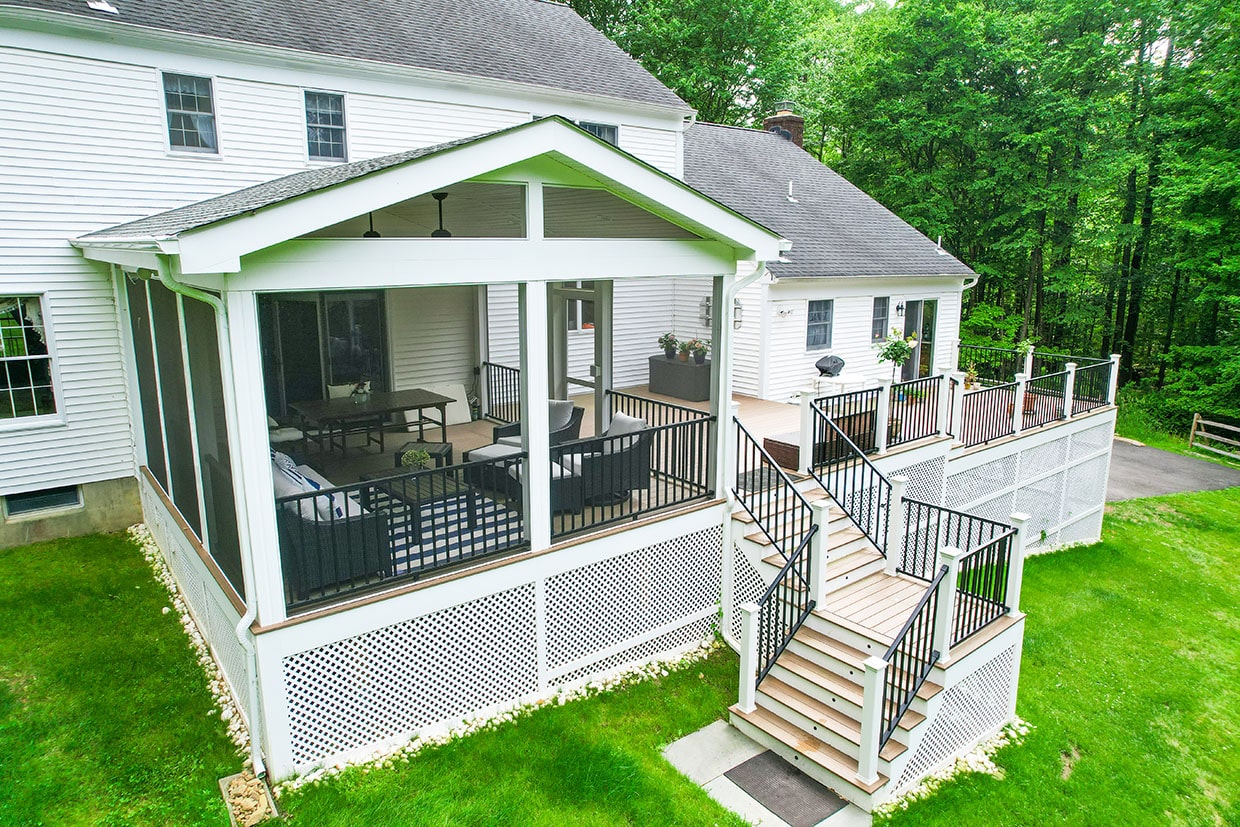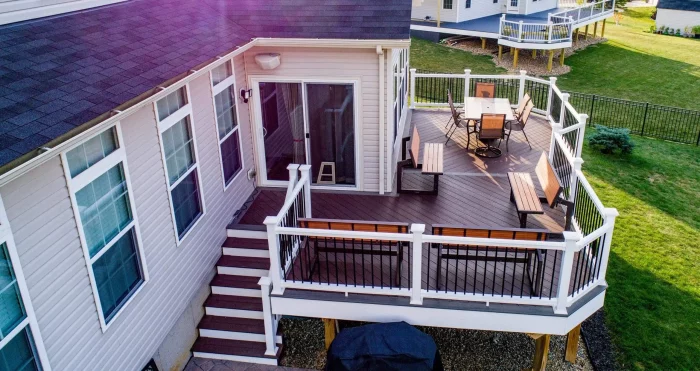Trex Decking: Where Quality and Development Meet for Your Home
Wiki Article
Specialist Tips on Selecting the Right Deck Products for Your Home
Picking the optimal deck products for your home is a considerable choice that requires careful factor to consider. The choice of materials not only impacts the appearances but also the sturdiness and upkeep of your deck. With a wide range of alternatives readily available on the market, from traditional timber decks to contemporary composite and PVC choices, making a notified choice is critical. By comprehending the key factors influencing this option, you can make sure that your deck not just matches your home however additionally stands the examination of time.Aspects to Think About Before Selecting
Before selecting deck products for your home, it is vital to very carefully examine a number of essential factors that will influence your decision. The initial aspect to think about is the climate in which you reside. Various products hold up against differing climate condition in a different way. As an example, if you live in an area with high humidity or frequent rainfall, you may want to choose products like composite decking that are more immune to moisture and mold and mildew. On the other hand, if you stay in a warm and dry environment, materials like redwood or cedar can be appropriate due to their all-natural resistance to decay and insects.Alternatively, composite decking needs marginal upkeep, generally just needing periodic cleaning to protect its look. Recognizing your readiness to spend time and initiative right into keeping your deck is essential for making a decision that aligns with your way of life and preferences.

Advantages And Disadvantages of Wood Decks
Taking into consideration the various factors that influence the option of deck materials, it is vital to evaluate the benefits and downsides of wood decks. Wood decks use a conventional and natural look that many home owners like. They can be tarnished or repainted to match the aesthetic of your home and are relatively easy to deal with for DIY projects. In addition, timber is a renewable energy, making it an eco friendly choice.Nonetheless, wood decks call for routine upkeep, such as discoloration or sealing, to protect against rot, degeneration, and insect problems. Timber decks tend to have a much shorter life-span compared to other outdoor decking materials like composite or PVC.
Discovering Composite Decking Options
When reviewing decking materials for your home, discovering composite options provides a durable and low-maintenance option to typical wood decks. Composite outdoor decking is a mix of timber fibers and recycled plastic, made to mimic the look of wood while offering a series of advantages. One substantial benefit of composite decking is its longevity; it is resistant to rot, bending, splintering, and pest damages, making it a lasting option for your outside room.Along with its durability, composite outdoor decking calls for marginal upkeep contrasted to timber decks. You won't need to discolor, seal, or sand composite boards regularly, conserving you time and effort in the future - Trex Decking. Compound decking is additionally readily available in a selection of styles and colors, allowing you to customize your deck to fit your visual choices
Additionally, composite decking is green as it is frequently made from recycled materials, reducing the need for new hardwood. While the preliminary price of composite outdoor decking may be greater than wood, the lasting cost savings on maintenance and substitute make it an affordable alternative for lots of homeowners seeking a eye-catching and trustworthy decking product.
Understanding PVC and Plastic Decking
PVC and vinyl outdoor decking are contemporary alternatives to typical wood outdoor decking materials, supplying distinct benefits for house owners seeking a long lasting and low-maintenance choice for their exterior spaces. PVC, or polyvinyl chloride, decking is made from web 100% artificial materials, giving excellent resistance to wetness, fading, and pest damages. This makes PVC outdoor decking a long-lasting choice that calls for minimal upkeep contrasted to timber. Additionally, PVC decking is readily available in a large array of styles and colors, enabling homeowners to personalize their exterior living locations to suit their preferences.Likewise, vinyl decking is additionally a synthetic product recognized for its sturdiness and low useful source maintenance demands. Vinyl outdoor decking is generally made from PVC, providing similar benefits such as resistance to mold and mildew, mildew, and rot. It is also an affordable choice in the long run, as it does not need staining, sealing, or paint like timber decking does. Property owners can enjoy their outside rooms without the worry of extensive maintenance with PVC and plastic decking options.
Contrasting Deck Product Costs
To make enlightened decisions concerning outdoor decking materials, examining and contrasting the expenses of numerous choices is important for property owners looking to spend wisely in their exterior spaces. When contrasting deck material prices, aspects such as initial costs, maintenance demands, and longevity needs to be considered.
Compound outdoor decking, made from a blend of wood fibers and recycled plastics, has a tendency to have a greater upfront cost but reduced upkeep needs. This can result in long-lasting expense financial savings despite the first investment.
PVC and vinyl decking, while sturdy and low-maintenance, are among the more expensive choices. Their long life and minimal upkeep requirements can make them affordable options in the long run.

Final Thought
To conclude, selecting the best deck materials for your home entails careful consideration of factors such as expense, upkeep, and longevity. Timber decks provide a classic appearance yet need regular upkeep, while composite outdoor decking gives a low-maintenance choice with an array of designs. PVC and plastic decking are durable and very easy to preserve yet may come with a higher cost. Inevitably, evaluating the advantages and disadvantages of each product will assist you make an informed choice for your outdoor space.Thinking about the numerous factors that influence the option of deck products, it is necessary to weigh the advantages and downsides of timber decks - Trex Decking. Timber decks tend to have a much shorter life-span compared to other decking materials like composite or PVC
When reviewing decking materials for your home, checking out composite options presents a low-maintenance and sturdy alternative to conventional timber decks.PVC and plastic decking are contemporary choices to conventional wood outdoor decking products, using special benefits for homeowners seeking a low-maintenance and resilient choice for their outside areas. Wood decks provide a traditional appearance yet call for normal maintenance, while composite outdoor decking provides a low-maintenance option with a range of designs.
Report this wiki page